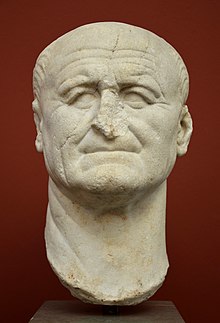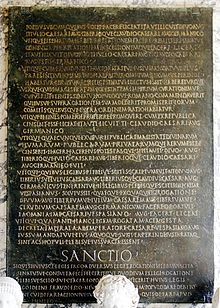Lex de imperio Vespasiani
The Lex de imperio Vespasiani is the inaugural law of the Roman emperor Vespasian , whose adoption in the Senate Tacitus dates on December 22, 69 AD. It is probably the last lex in the sense of the republican legislative tradition and is preserved in its second half. In addition to the Res Gestae Divi Augusti , the document is considered to be one of the most important inscriptions of the Roman Empire .
The text already has the outward form of a senate resolution , but at the same time it was passed as a law by the people's assembly before it lost its legislative competence to the senate and in particular to the emperor. In it, Vespasian , the victor of the civil war, is given a number of powers which, in addition to the legal basis of the principate created by Augustus , should formally transfer the imperial dignity to the new ruler. The emperor's dominant position of power was apparently intended to remain compatible with the republican order and was therefore based on the one hand on the imperium proconsulare maius, i.e. H. the extended command over the border provinces (which included the supreme command over the majority of the legions ), and on the other hand on the tribunicia potestas , i.e. the extended rights of the people's tribunes , which included the right of veto on senate decisions. The lex de imperio also transfers en bloc to Vespasian all other special powers granted to Augustus, Tiberius and Claudius.
Lore history
The second half of the law is preserved on a bronze plaque. It was discovered in 1347 in the Lateran Basilica and brought to the public by the ruler of the city of Rome at the time, Cola di Rienzo , to demonstrate to the Pope that his power was being restricted under constitutional law. Today it is on display in the Capitoline Museums in Rome.
Latin text and translation (excerpt)
|
|
Individual determinations and interpretation

The fact that an identical or similar bundle of laws had been awarded to all predecessors since Tiberius or Caligula took office is hardly doubted in recent special studies due to largely clear evidence in historiography. The law as such can hardly be interpreted with the lack of legitimation of the founder of the as yet unknown Flavian dynasty, as is often done in research, at best the public exhibition of the document, which probably contributed to its preservation.
Since the individual clauses are each introduced with the phrase utique ("that [he should be allowed ...]"), the inscription is a Senate decision, at the end of which a sanctio (sentence for violation of the law) is added which shows that the Senate resolution ( senatus consultum ) was formally approved as a law ( lex ) in the People's Assembly without changing the original wording. In research one sees this unanimously as a symbol of the people's assembly, which meets only formally and without creative power.
The majority of the clauses contain official powers that were already largely included in the two offices permanently held by the emperor since Augustus: The conclusion of treaties with outer kingdoms (clause 1) was part of the imperium proconsulare maius, the formal supreme command of the border provinces with strong legions. The right of the Senate to convene, to implement and to have a decision-making power (clauses 2 and 3) was already contained in the tribunicia potestas , the extended official authority of the tribunes through which the emperor ruled in the civil and urban Roman spheres. It is unclear why these competencies were also awarded. It is possible that the republican authority should be clarified and expanded.
In addition, Augustus' preference for his own candidates, probably still exercised by general consensus, is formally sanctioned when the highest government offices are awarded (Clause 4). The possibility of enlarging the Pomerium , the sacred city limits of Rome, probably only had a cultic function and hardly a practical one (Clause 5). The emperor should possibly be associated with the city founder Romulus , to whom the original establishment of the pomerium is ascribed.
The interpretation of clauses 6 and 7. Clause 6, also known as the “discretionary clause”, gives the emperor in its literal interpretation the absolute freedom of discretion that seems to be incompatible with the construction of the principle created by Augustus (literal translation for example : “That everything that may seem good to him for the benefit of the state and with respect for divine and human, public and private institutions, he has the right and authority, just like the deified Augustus, Tiberius and Claudius ").
It is therefore assumed in recent research that the formulaic expressions of the clause have a restrictive function. One possible approach is to understand the reference to the predecessors in office (who at that time had not been extinguished in memory) in the sense that Vespasian was bound by those laws that were passed under his predecessors and that were still in force with regard to discretion. Then this addition makes little sense for clauses 1, 2 and 5, to which it is also attached (also for clause 7). In particular, the right to expand the Pomerium, which refers only to Claudius, for whom the expansion of the Pomerium is confirmed in writing, appears contradictory under this interpretation. Another interpretation traces the phrase “for the benefit of the state” back to models in republican inscriptions on law, which in this context prescribed certain, but rather non-binding, limitations for the official.
The first-mentioned approach argues mainly with the wording of Clause 7, which makes Vespasian in principle independent of the legislative power of the Senate and the People's Assembly, but only in the area of what was customary among the predecessors and, conversely, all the privileges agreed upon under the predecessors in their entirety transmits. If all special powers were actually granted en bloc, the listing of selective laws in the inscription would be superfluous. The clause was therefore understood more as an invitation to the emperor to adhere to his “good” predecessors when exercising the law. However, the additional naming of individual competencies can also be justified with the ancient legal tradition, which, unlike in modern normative law, provided for the repeated updating of existing laws where relevant.
The final (“retroactive”) clause confirms the validity of Vespasian's decisions before the Inaugural Act came into force. Their retroactive effect is usually related to the dies imperii Vespasians, the accession of the emperor, Tacitus to the day of the acclamation by the army (July 1, 69 AD), not, as usual, the resolution of the senate. Thus, this clause could not already have been included in the corresponding inaugural laws of the predecessor. However, it is also possible to see it as a technical provision to bridge the period between the decision-making in the Senate and legislation by the People's Assembly, i.e. traditional law.
The exact interpretation of the formulaic, sometimes archaic text is also difficult because systematic collections of laws that could be used for comparison have only been created since the third century, and the formal authority of the emperor is likely to have changed significantly. The discussion of this question depends not only on the individual questions of Vespasian's reign, but also on the constitutional powers of the emperor in the early principate .
literature
- Peter Brunt : Lex de imperio Vespasiani. In: Journal of Roman Studies . Volume 67, 1977, pp. 95-116 (basic article, although it does not reflect the latest research).
- Angela Pabst : "... ageret faceret quaecumque e re publica censeret esse". Approaches to the lex de imperio Vespasiani. In: Werner Dahlheim (Hrsg.): Festschrift Robert Werner on his 65th birthday (= Xenia 22). Universitäts-Verlag Konstanz, Konstanz 1989, ISBN 3-87940-356-2 , pp. 125-148.
- Luigi Capogrossi Colognesi, Elena Tassi Scandone (ed.): La "Lex de imperio Vespasiani" e la Roma dei Flavi. Atti del convegno, November 20-22, 2008 (= Acta Falviana. Volume 1). L'Erma di Bretschneider, Rome 2009
Remarks
- ↑ CIL 6, 930 = 31207 = Hermann Dessau , Inscriptiones Latinae selectae (ILS) 244.
- ↑ Tacitus, Historiae 4,3,3 ( online ).
- ↑ Christoph F. Wetzler: Rule of Law and Absolutism: Considerations on the Constitution of the Late Antique Empire based on CJ 1.14.8 , (= Freiburg legal-historical treatises ). At the same time: University, dissertation, Freiburg (Breisgau), 1995/96. Duncker and Humblot, Berlin 1997, ISBN 3-428-08968-5 , p. 79 (FN 22).
